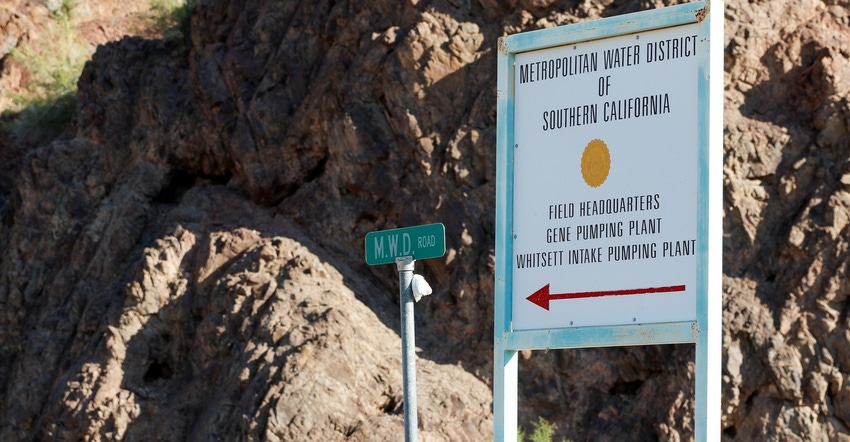
The U.S. Supreme Court’s recent decision to nix a settlement between Texas and New Mexico over the management of the Rio Grande River could have a sweeping impact on other interstate water disputes in the West, incentivizing states to avoid lawsuits that would cause the federal government to intervene, a Salt Lake City-based water attorney says.
Such disputes include those involving the Colorado River, in which the Upper and Lower Basin states have submitted competing water conservation plans to the U.S. Bureau of Reclamation, notes Gage Zobell, a water law expert and partner at the international law firm Dorsey and Whitney.
The high court’s 5-4 ruling on June 21 set aside a federal judge’s approval of a plan for how New Mexico, Texas and Colorado must share water from the Rio Grande, siding with the federal government’s complaint that the pact insufficiently addressed groundwater pumping in New Mexico.
Justices remanded the case back to U.S. Circuit Judge Michael Melloy, a court-appointed special master, for further talks.
“Texas v. New Mexico stands to be the landmark water law decision of the 21st century as it recognizes a federal interest that likely affords the federal government a seat at almost all future interstate compact negotiations,” Zobell said.
The decision was somewhat unexpected, the attorney said, considering that the justices’ questions during oral arguments suggested a majority would side with the states.
“The immediate aftermath of the decision is, frankly, uncertainty as to the future of apportionment and water usage along the Rio Grande,” Zobell said. “The implications stretch from Southern Colorado through Texas.”
Competing proposals
The decision comes as the Bureau of Reclamation is considering long-term water-sharing plans for the Colorado River basin, which includes Wyoming, Colorado, New Mexico, Utah, Nevada, Arizona and California as well as Mexico. The Upper and Lower Basin states disagree on how the river is to be managed after its current compact expires in 2026, and the bureau’s assessment of possible approaches is due out in December.
Earlier this year, the three southwestern-most states proposed cuts in water use to begin if levels in Lake Powell and Lake Mead fall below 69% of capacity and ramp up if the levels keep falling. In most years, California – the senior right holder – would lose about 10% of its current supplies, while Arizona would cut its use by 27% and Nevada would lose about 17%, CalMatters reports.
The Upper Basin states – Wyoming, Colorado, Utah and New Mexico -- are proposing cuts to begin when reservoir levels dip below 90% of capacity, and are asking that operations be based on actual conditions rather than “unreliable forecasts.”
While Texas v. New Mexico dealt specifically with the Rio Grande, it established a precedent that would apply if the courts were to adjudicate disputes in other states, including those on the Colorado, Zobell said.
“The upper and lower basin states of the Colorado River have added incentive to find agreement and avoid bringing an interstate lawsuit before the Supreme Court,” he told Farm Press in an email. “If any one state – looking at you, California – fails to find reasonable accommodation and a lawsuit is filed, the Upper and Lower Basin states should expect to see the U.S. Bureau of Reclamation move to intervene in the case.”
Future disputes
At question in future disputes is whether states and the Supreme Court can differentiate their cases from the Rio Grande decision, which Zobell said is causing uncertainty for growers in Texas and New Mexico as to how land will be irrigated.
“This reminds me of the recent issue in Idaho where you had 500,000 acres of planted cropland held hostage to a potential water curtailment,” Zobell said. The drought-induced curtailment was avoided in mid-June when Idaho and local groundwater districts reached a compromise for this season.
“If New Mexico farmers are unclear if their groundwater usage is allowed in the future, do you risk planting crops?” he said. “This question has to be on everyone’s mind as we wait on if the United States Bureau of Reclamation comes to the settlement table quickly or simply uses the SCOTUS decision to enforce its interests against the states.”
The decision saw Chief Justice John Roberts join justices Ketanji Brown Jackson, Brett Kavanaugh, Elena Kagan and Sonia Sotomayor in the majority, with conservatives Neil Gorsuch, Amy Coney Barrett, Clarence Thomas and Samuel Alito dissented.
Writing for the majority, Jackson cited a 1986 decision that parties in litigation agreements may not disregard the interests of third parties. In his dissenting opinion, Gorsuch said Reclamation’s involvement in the Rio Grande dispute is an example of federal overreach.
“(T)he federal government seeks to prolong this original jurisdiction dispute, a form of litigation usually reserved for disputes between states, over the objection of both Texas and New Mexico,” Gorsuch wrote. “And it does so despite the fact the consent decree would leave the federal government free to pursue any claims it believes it has in the lower courts, where disputes between the federal government and states are normally tried.
‘A serious assault’
“The court’s decision is inconsistent with how original jurisdiction cases normally proceed,” he wrote. “It defies 100 years of this court’s water law jurisprudence. And it represents a serious assault on the power of states to govern, as they always have, the water rights of users in their jurisdictions.”
Zobell said he wonders if Gorsuch and some other justices regret their decision in 2018 to allow the federal government to intervene in the case.
“In short, to avoid giving the U.S. Bureau a seat at the table, all states are motivated to negotiate a settlement to disputes,” he said. “For the Colorado River, we will see if this reality lowers the posturing that seems to be par for the course.”
About the Author(s)
You May Also Like






